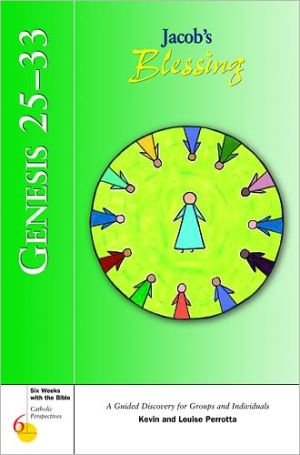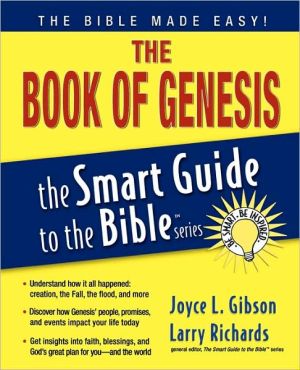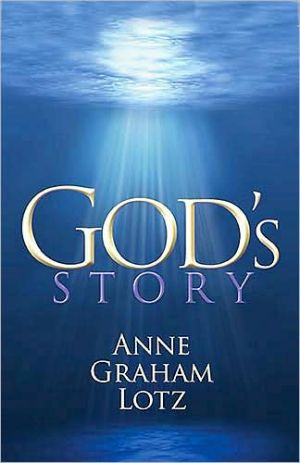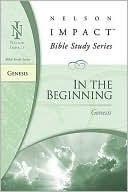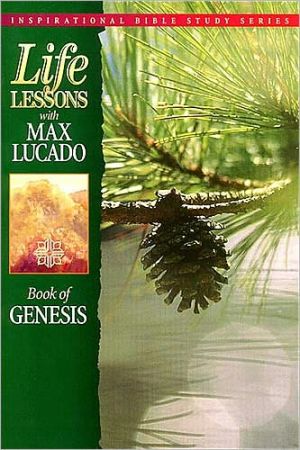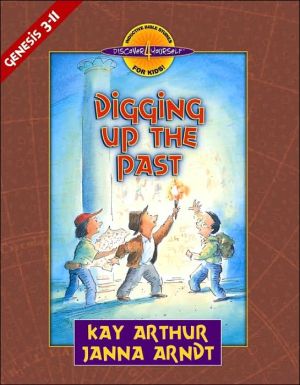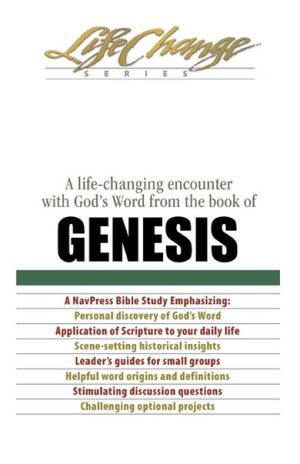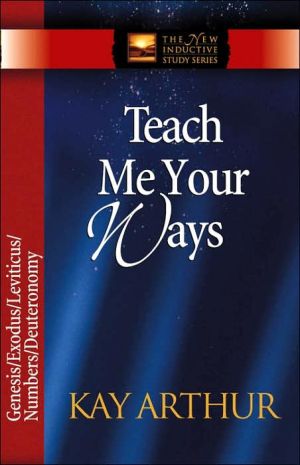Genesis 25-33: Jacob's Blessing
Jacob's story shows us how God's love prevails through the conflicts and failures of a troubled family. In Genesis 25–33: Jacob's Blessing, authors Kevin and Louise Perrotta guide readers through Jacob's story, showing how this ancient biblical account still speaks volumes to us today.\ A Guided Discovery of the Bible The Bible invites us to explore God’s word and reflect on how we might respond to it. To do this, we need guidance and the right tools for discovery. The Six Weeks with the...
Search in google:
This award-winning series guides individuals and groups through the meaning of Scripture and its application to everyday life. Over 100,000 in print! For busy adults who want to study the Bible but don't know where to begin, Six Weeks with the Bible provides an inviting starting point. Each guide is divided into six concise, 90-minute segments that introduce one book of the Bible. All biblical text is printed in the guides, which means no additional study aids are required.
How to Use This Guide\ \ You might compare the Bible to a national park. The park is so large that you could spend months, even years, getting to know it. But a brief visit, if carefully planned, can be enjoyable and worthwhile. In a few hours you can drive through the park and pull over at a handful of sites. At each stop you can get out of the car, take a short trail through the woods, listen to the wind blowing through the trees, get a feel for the place.\ In this booklet, we will read the main portion of the story of Jacob: Genesis 25–33. We will take a leisurely walk through the six readings, giving ourselves the opportunity to think carefully about what we are reading and what it means for our lives today. Jacob’s life certainly makes for interesting reading, but it also gives us a great deal to reflect on.\ This guide provides everything you need to explore the story of Jacob in six discussions—or to do a six-part exploration on your own. The introduction on page 6 will prepare you to get the most out of your reading. The weekly sections provide background and explanations that will help you grasp what this biblical narrative means for you today. Equally important, each section supplies questions that will launch your group into fruitful discussion, helping you to both investigate the biblical text for yourself and learn from one another. If you’re using the booklet by yourself, the questions will spur your personal reflection.\ Each discussion is meant to be a guided discovery.\ Guided. None of us is equipped to read the Bible without help. We read the Bible for ourselves but not by ourselves. Scripture was written to be understood and applied in the community of faith. So each week “A Guide to the Reading,” drawing on the work of both modern biblical scholars and Christian writers of the past, supplies background and explanations. The guide will help you grasp the message of Genesis. Think of it as a friendly park ranger who points out noteworthy details and explains what you’re looking at so you can appreciate things for yourself.\ Discovery. The purpose is for you to interact with this biblical story. “Questions for Careful Reading” is a tool to help you dig into the text and examine it carefully. “Questions for Application” will help you consider what these words mean for your life here and now. Each week concludes with an “Approach to Prayer” section that helps you respond to God’s word. Supplementary “Living Tradition” and “Saints in the Making” sections offer the thoughts and experiences of Christians past and present. By showing what the story of Jacob and its themes have meant to others, these sections will help you consider what they mean for you. “Between Discussions” sections offer further background and points for reflection.\ How long are the discussion sessions? We’ve assumed you will have about an hour and a half when you get together. If you have less time, you’ll find that most of the elements can be shortened somewhat.\ Is homework necessary? You will get the most out of your discussions if you read the weekly material and prepare answers to the questions in advance of each meeting. If participants are not able to prepare, have someone read the “Guide to the Reading” sections aloud at the points where they appear.\ What about leadership? If you happen to have a world-class biblical scholar in your group, by all means ask him or her to lead the discussions. In the absence of any professional Scripture scholars, or even accomplished amateur biblical scholars, you can still have a first-class Bible discussion. Choose two or three people to take turns as facilitators, and have everyone read “Suggestions for Bible Discussion Groups” (page 92) before beginning.\ Does everyone need a guide? a Bible? Everyone in the group will need his or her own copy of this guide. It contains the entire text of the readings from Genesis, so a Bible is not absolutely necessary—but each participant will find it useful to have one. You should have at least one Bible on hand for your discussions. (See page 96 for recommendations.)\ How do we get started? Before you begin, take a look at the suggestions for Bible discussion groups (page 92) or individuals (page 95).\ Jacob and Family\ A pious but somewhat passive father. A decisive but unscrupulous mother. Twin boys, opposites in temperament, each favored by one parent. Envy, disrespect, deception, rage. It sounds like the checklist of a family headed toward counseling. But this is a family selected by God to play a crucial role in his saving plan for the world—the family of Isaac and Rebekah and their sons, Esau and Jacob. They are the ancestors of the people of Israel. Jacob, in fact, is the man after whom Israel is named (he receives the name Israel in the course of the story we are about to read).\ The account of Isaac and Rebekah’s relationally challenged family illustrates one of the Bible’s most remarkable features: its frank display of heroes’ sins. The Old Testament historians narrate in damning detail how King David, the golden boy of Israel’s golden age, committed adultery with the wife of one of his military officers and then used the man’s courage in battle to bring about his death. The Gospel writers tell us that as soon as Jesus was arrested, Peter, the disciple on whom he had lavished the greatest privileges, swore up and down that he did not even know Jesus. In the story we will be reading, Jacob exploits his elderly father’s physical disability to deprive his brother of his inheritance.\ The Bible can be honest about its heroes’ failings because it is less concerned with honoring them than with honoring God. God is the true hero of the biblical story. When human beings reject his path of integrity and faithfulness, God takes the opportunity to offer forgiveness and open a road to restoration. Nothing more sharply highlights this divine mercy than God’s dealings with Jacob.\ The Bible’s honesty about the failings of Jacob and his kin—and its emphasis on God’s grace—makes this story accessible to all of us. We all have firsthand knowledge of envy. Most of us have told our share of lies. Certainly we all need God’s mercy. Thus we can all find points of connection with the story of Jacob. At every turn, it sparks reflections about our own experience of sin, repentance, and grace. The account of Jacob is like a great movie, novel, or play—it gives us much to ponder with regard to our own lives.\ Jacob’s story is part of a larger one. Most immediately, it is part of a family saga. The saga, in turn, is part of the story of the people of Israel and the Church.\ The Bible traces the unfolding of God’s purposes for humanity. In an early phase of this plan—after creation and after humankind’s refusal to cooperate with God (Genesis 1–11)—God selects a couple named Abraham and Sarah, originally residents of what is now southern Iraq, and makes them participants in his plan. After guiding them on a long journey that ends in present-day Israel and Palestinian territories, God promises to give their descendants the land and to make them into a nation through whom the peoples of the world will be blessed (12:1–7; throughout this guide, chapter and verse numbers refer to the book of Genesis unless otherwise noted). God renews this promise to Isaac, Abraham and Sarah’s son, and, as we shall see, to Isaac’s son Jacob. Jacob’s twelve sons become the ancestors of twelve tribes—groups of shepherding people—with whom God makes a covenant through a leader named Moses. The people formed by this covenant are called Israel. The Israelites go through many ups and downs in their relationship with God over a period of centuries. Ultimately, God himself is born as a member of this people, taking on our human nature in the person of Jesus of Nazareth.\ On its own, the story of Jacob is a tale of God’s unpredictable kindness: a young man goes wrong, but God nevertheless protects him and leads him to a better life. In the context of the larger biblical history, Jacob’s story is a striking instance of God’s tendency to select unlikely people to be key players in his saving plan for the world. The story of Jacob thus reflects God’s amazing grace and God’s amazing choosing.\ To read the story of Jacob in light of all its connections with the larger story of salvation would be a daunting task. Since this guide is meant to be introductory, we will focus simply on the story itself—in fact, only chapters 25 through 33 (Jacob’s story continues through chapter 50). Once you have become familiar with the account of Jacob in these chapters, you will be in a better position to explore its connections with the rest of the Bible.\ The story of Jacob is artfully told. The authors were master storytellers who gave attention to the smallest details. Theirs is artistry in miniature. In an average translation, the story we are about to read covers only a dozen pages. Within this short narrative, phrases, single words, even silences carry a weight of meaning.\ If you match the authors’ careful writing with careful reading, you will not regret the effort. Close reading of the story will provoke questions. Once you are looking for answers, you will be more alert to details that you might otherwise have ignored. The process of lingering over details, asking questions, and searching for answers will lead you into the heart of the story.\ For example, consider Jacob’s statement to Isaac in 27:20. Jacob speaks to his father of “the Lord your God.” The careful reader will pause and wonder, “Why does Jacob say your God? Isn’t Isaac’s God also Jacob’s God? What kind of relationship does Jacob have with God? How is Jacob’s relationship with God reflected in—and affected by—his relationship with his father, Isaac?” Having asked these questions, we will be more likely to notice clues that the authors have provided to the answers. Thus we will pay attention when Jacob later describes his family and possessions as “graciously given” by God (33:5). Jacob no longer speaks of God as someone else’s deity. The simple absence of the adjective your betokens a change in Jacob’s relationship with the Creator—a change that lies at the center of the entire story.\ In this guide, the Questions for Careful Reading and the Guides to the Reading each week will point out such details and raise such questions. Of course, it will then be up to you to ponder the questions—and to reflect on the issues that the story raises for your life and for the world today.\ We have referred to the “authors.” Who were they? The story of Jacob, like the other accounts of his family—from his grandparents Abraham and Sarah to his grandchildren—was handed on in oral traditions, possibly for centuries, among the ancient Israelites. The stories were probably written down and edited by many scribes over a long period, perhaps from the tenth to the fifth centuries before Christ. The writers may have woven together varying traditions, which may explain some of the occasional rough edges and unevenness (we will meet an example of this in week 6, in the story of Jacob’s mysterious wrestling match). Nevertheless, the final product is a masterful series of family tales that convey much about God’s purposes in history and his ways of relating to human beings.\ In brief, the authorship of the Jacob stories is a complex subject. For our purposes in this guide, however, it is enough to know that the authors were sages of ancient Israel inspired by the Holy Spirit.\ A word about geography: as our story begins, Isaac and Rebekah are living at an oasis in the Sinai desert called Beer-lahai-roi. Later, they move north to the edge of the settled land at Beersheba (in the south of the modern state of Israel). From there, Jacob travels north, stopping in Bethel, in what is now the Palestinian territory often referred to as the West Bank, and continues on through present-day Syria. His journey takes him to Haran, today in south-central Turkey. On his return, Jacob journeys back through Syria into present-day Jordan, where the climactic scene in chapter 33 occurs. Later Jacob goes to Shechem (today in the West Bank). Esau’s residence in Seir is in the south of modern Jordan.\ The immediate background to the opening events of the story is as follows. Some years earlier, Abraham sends a servant from Beersheba to Haran to find a bride for his son Isaac from among Abraham’s relatives. At a well near Haran, the servant meets Rebekah, one of Abraham’s nieces. Seeing God’s hand in this chance encounter, he suggests that Rebekah become Isaac’s wife. Her family assents to the marriage (significantly for our present story, her brother, Laban, seems to be won over by the signs of Abraham’s wealth). Asked by her family if she would like to put off her journey to her new home while the family celebrates, Rebekah answers instead, “Let’s go!” The servant escorts her to Beersheba, where she and Isaac are wed.\ Week 1\ Conflict Begins at Conception\ Questions to Begin\ 15 minutes Use a question or two to get warmed up for the reading.\ 1 What kind of baby were you?\ ? I was a “good” baby. (I slept a lot and didn’t cry much.)\ ? I was generally cheerful and easygoing.\ ? I was fairly demanding.\ ? My birth signaled the beginning of a period of severe sleep-deprivation for my mother.\ ? I was a real stinker.\ 2 How early in life do children’s distinctive personalities begin to appear?\ 3 Describe a situation in which you made a quick decision. How happy were you with the results?\ Opening the Bible\ 5 minutes Read the passage aloud. Let individuals take turns reading paragraphs.\ The Reading: Genesis 25:20–34; 26:34–27:17\ A Difficult Pregnancy\ 25:20 Isaac was forty years old when he married Rebekah, daughter of Bethuel the Aramean of Paddan-aram, sister of Laban the Aramean. 21 Isaac prayed to the Lord for his wife, because she was barren; and the Lord granted his prayer, and his wife Rebekah conceived. 22 The children struggled together within her; and she said, “If it is to be this way, why do I live?” So she went to inquire of the Lord. 23 And the Lord said to her,\ \ “Two nations are in your womb,\ and two peoples born of you shall be divided;\ the one shall be stronger than the other,\ the elder shall serve the younger.”\ \ 24 When her time to give birth was at hand, there were twins in her womb. 25 The first came out red, all his body like a hairy mantle; so they named him Esau.a 26 Afterward his brother came out, with his hand gripping Esau’s heel; so he was named Jacob.b Isaac was sixty years old when she bore them.\ Heading toward Crisis\ 27 When the boys grew up, Esau was a skillful hunter, a man of the field, while Jacob was a quiet man, living in tents. 28 Isaac loved Esau, because he was fond of game; but Rebekah loved Jacob.\ 29 Once when Jacob was cooking a stew, Esau came in from the field, and he was famished. 30 Esau said to Jacob, “Let me eat some of that red stuff, for I am famished!” (Therefore he was called Edom.c) 31 Jacob said, “First sell me your birthright.” 32 Esau said, “I am about to die; of what use is a birthright to me?” 33 Jacob said, “Swear to me first.” So he swore to him, and sold his birthright to Jacob. 34 Then Jacob gave Esau bread and lentil stew, and he ate and drank, and rose and went his way. Thus Esau despised his birthright. . . .\ 26:34 When Esau was forty years old, he married Judith daughter of Beeri the Hittite, and Basemath daughter of Elon the Hittite; 35 and they made life bitter for Isaac and Rebekah.\ A Sudden Opportunity\ 27:1 When Isaac was old and his eyes were dim so that he could not see, he called his elder son Esau and said to him, “My son”; and he answered, “Here I am.” 2 He said, “See, I am old; I do not know the day of my death. 3 Now then, take your weapons, your quiver and your bow, and go out to the field, and hunt game for me. 4 Then prepare for me savory food, such as I like, and bring it to me to eat, so that I may bless you before I die.”\ 5 Now Rebekah was listening when Isaac spoke to his son Esau. So when Esau went to the field to hunt for game and bring it, 6 Rebekah said to her son Jacob, “I heard your father say to your brother Esau, 7 ‘Bring me game, and prepare for me savory food to eat, that I may bless you before the Lord before I die.’ 8 Now therefore, my son, obey my word as I command you. 9 Go to the flock, and get me two choice kids, so that I may prepare from them savory food for your father, such as he likes; 10 and you shall take it to your father to eat, so that he may bless you before he dies.” 11 But Jacob said to his mother Rebekah, “Look, my brother Esau is a hairy man, and I am a man of smooth skin. 12 Perhaps my father will feel me, and I shall seem to be mocking him, and bring a curse on myself and not a blessing.” 13 His mother said to him, “Let your curse be on me, my son; only obey my word, and go, get them for me.” 14 So he went and got them and brought them to his mother; and his mother prepared savory food, such as his father loved. 15 Then Rebekah took the best garments of her elder son Esau, which were with her in the house, and put them on her younger son Jacob; 16 and she put the skins of the kids on his hands and on the smooth part of his neck. 17 Then she handed the savory food, and the bread that she had prepared, to her son Jacob.\ \ a The name means “mantled,” or “covered”—in this case, with hair.\ b That is “He takes by the heel” or “He supplants.”\ c That is “Red.” Esau was regarded as the ancestor of the Edomites, who lived in the south of present-day Jordan.\ \ Questions for Careful Reading\ 10 minutes Choose questions according to your interest and time.\ 1 How long were Isaac and Rebekah married before they had children?\ 2 Esau seems not to value his birthright. What does Jacob value? What does he not value?\ 3 In 27:7, Rebekah summarizes what Isaac said to Esau (27:2–4). What does she add? What might the addition suggest about the kind of person she is?\ 4 Locate the references to family relationships in the conversation between Rebekah and Jacob (“my son,” “your father,” etc.). Are they all necessary? What effect do they create? What similar relationship terms could have been used but are not? What might their absence imply?\ 5 How well have Rebekah and Jacob considered their plan? What seems likely to happen as a result of their deception?\ 6 What are the strengths and weaknesses of each member of the family in this story? How is Jacob like his mother?\ A Guide to the Reading\ If participants have not read this section already, read it aloud. Otherwise go on to “Questions for Application.”\ 25:19–26. If, as would have been normal in the culture, Rebekah was in her teens when she married Isaac, she must be in her thirties when she becomes pregnant for the first time (25:20, 26)—and with twins, no less. No wonder it is a difficult pregnancy.\ At first, Isaac and Rebekah seem to be a devout couple. Isaac prays for Rebekah; she consults God (how, we are not told). Rebekah’s answer-to-prayer conception suggests that God has great plans for these children. Yet the boys are already pushing each other around in the womb (25:22), and God tells Rebekah to expect trouble between them (25:23). We may wonder whether the infants’ innate combativeness reflects some hidden conflict between their pious parents.\ The first baby’s ruddy complexion would be taken as a sign of his future physical prowess, his hairiness as a token of his lack of refinement. The second baby is born “afterward”—the word seems tongue-in-cheek, for he is born with his brother, gripping Esau’s heel as though trying to prevent him from getting into the world first. Despite their almost simultaneous births, the boys have entered life in a definite order. Esau is the firstborn, a position that grants him certain privileges and responsibilities in the society of the time.\ 25:27–28. Given the congenital conflict between the sons, we may well fear that the parents’ opposing preferences for different sons will bring Isaac and Rebekah into conflict with each other.\ 25:29–34. “Birthright” refers to the rights and rank of the firstborn son. In the ancient Near East, the oldest son inherited a double share of the family’s possessions and became the head of the extended family. The birthright status could be transferred if the eldest son wished to bargain it away to another male relative in return for some immediate gain.\ “Let me eat some of that red stuff” is more literally “Let me gulp down some of that red red stuff.” The words for “red” and “blood” are similar in Hebrew. Perhaps Esau thinks that Jacob is cooking a blood broth that will give him renewed vitality. The words “ate,” “drank,” “rose,” “went his way,” and “despised” follow in rapid succession. Biblical scholar Nahum Sarna remarks that the verbal staccato reproduces “the chilling, sullen atmosphere in which Esau silently devours the meal.” The stew turns out to have consisted of red lentils rather than anything magical or exotic. Esau has indeed valued his birthright lightly.\ 26:34–35. The bad light in which Esau stands grows worse still. He has not waited for his parents to arrange a marriage for him, as would have been normal in his society. Even worse, the women he has married give his parents a hard time. Since Isaac by this time is at least a hundred years old (see 25:26 and 26:34), Rebekah may be contemplating the possibility of life as a widow. In the culture of the time, a widow was dependent on her adult sons. Rebekah can hardly welcome the prospect of having to depend on Esau, whose wives are difficult to get along with.\ 27:1–17. Apparently the father’s blessing was separate from the birthright, for even though Esau has relinquished his birthright, he expects to receive Isaac’s blessing. The father’s blessing of the older son was a kind of sacramental act that channeled God’s gift of fertility and God’s provision of all that is needed for abundant life (see page 20). Since this blessing designated the recipient as the one who would exercise authority over the extended family (27:29), it could be given only to one son. And since it became effective as the father pronounced it, once spoken it could not be withdrawn. The blessing ceremony customarily included a meal. Nevertheless, the focus on food here (27:4, 7, 9, 14) draws an implicit parallel between Isaac and Esau. Both seem to be excessively concerned with eating (notice the reason why Isaac favors Esau—25:28).\ Rebekah seems to have no doubt that Jacob is well qualified for the task of deceiving his father, which suggests something about his character before this incident. His dark side is in full view in his response to his mother’s suggestion. His objection is merely “I shall seem to be mocking him” or “I will seem to him to be a trickster.” He has no problem with the idea of exploiting his father’s blindness. His only concern is whether it can be done successfully.\ Rebekah realizes that there is no time to lose standing around debating (27:13). They must act before Esau returns.\ Questions for Application\ 40 minutes Choose questions according to your interest and time.\ 1 Reread 25:28. Do parents who have more than one child inevitably favor one of them? What are the results of parental favoritism? What should parents do if they feel a tendency to favor one child?\ 2 Can rivalry between siblings be avoided? Is it always bad?\ 3 What religious beliefs and practices protect spouses from destructive conflict with each other? What additional factors are necessary for a husband and wife to grow in unity and love?\ 4 Do the members of this family respect one another? What difference does respect (or lack of respect) make in family relationships?\ 5 What are the dangers of acting impetuously? How can a person tell whether quick and decisive action is imprudent or wise?\ 6 Are you surprised that the Bible contains a story of selfish maneuvering and deception such as this one? What does its presence suggest about the kind of book the Bible is?\ 7 For personal reflection: Jacob could very well have thought that life had been unfair to him. With some slight repositioning in the womb, he would have been born first and would have lived his entire life as the elder son. Jacob might also have felt that his father was unfair to him: a difference in their personalities made him the less-favored son (25:28). When you were growing up, what aspects of your family relationships seemed less than ideal or even unfair? In what ways did your family background put you at a disadvantage in becoming who you wanted to be? Were your desires for your relationship with your parents frustrated? How have you dealt with these experiences? What constructive ways have you discovered for responding to them?\ The starting line for Bible study is not so much a matter of how much a person knows about the Bible as it is of faith in the Bible as the word of God and especially faith in the living, loyal God who speaks these words.\ Carroll Stuhlmueller, C.P., “Adult Bible Study: Norms and Goals,” New Theology Review\ Approach to Prayer\ 15 minutes Use this approach—or create your own!\ ♦ Use this time to pray for families. Begin with an Our Father. Allow time for silent prayer and for any petitions that participants would like to voice for their own and other families. End by praying together these words, adapted from a prayer for families by Pope John Paul II:\ May St. Joseph always guard, protect, and enlighten families.\ May the Virgin Mary, who is the mother of the Church, also be the mother of “the Church of the home.”\ May Christ the Lord be present in every home, bestowing light, joy, serenity, and strength.\ May every family generously make its own contribution to the coming of his kingdom in the world—a kingdom of truth and life, of holiness and grace, of justice, love, and peace.\ Saints in the Making Problems beneath the Surface\ This section is a supplement for individual reading.\ Beneath the peaceful surface of their marriage, Isaac and Rebekah were at odds with each other. Their story spurred one husband (who prefers to remain anonymous) to offer this reflection on his own marriage:\ In the early years of our marriage, Cheryl and I probably looked like a happy couple. I was a successful small businessman. We had wonderful children. We went to church. We seemed to have it together. But actually, Cheryl and I were locked into a lot of suppressed conflicts.\ The biggest area of tension was our finances. At that time, I was the one who earned the money and did the financial planning. It was my budget, which I imposed on Cheryl. Eventually, she began purposely overspending just to spite me—as I learned from her later.\ Through a series of unexpected incidents, both of us had a significant conversion to Christ. Soon afterward, a downturn in my business brought us into financial difficulties.\ One Sunday night, we made a decision to talk about our finances after the children had gone to sleep. I showed up at the kitchen table with my budget, calculator, and yellow tablet. But before I started talking, we were led by the Spirit to kneel down on the kitchen floor together and ask the Lord for help. Then I sat quietly and let Cheryl talk first and did not interrupt.\ I was astounded to learn that she was not against me and, further, that she had some really good ideas about how we could make our finances work better. She had several suggestions that proved revolutionary: first, that we meet like this twice a month before each of my paychecks to plan how to spend that infusion of money; second, that we use a priority system to manage our money. The third thing was that neither of us would ever spend more than we had decided we would without the other’s consent.\ Looking back thirty years later, I can honestly say we experienced this conversation as a major work of God, using the grace of the sacrament of matrimony. Not only did we begin working together on our finances for the first time, but our steps in the area of finances brought us into peace in other areas of our life also. God set us on the path of becoming more unselfish and loving toward each other.\ Between Discussions\ \ Well, That’s a Blessing\ As Isaac rests on his bed and Esau crouches in wait for a gazelle and Rebekah hands the savory dish to Jacob and Jacob steps to the entrance of his father’s tent, all are thinking of one thing: the blessing. The father’s blessing is the center of attention. What is this blessing?\ We may be familiar with blessings in the Church today, but the concept of blessing has undergone much development in the biblical and Christian traditions. To grasp the meaning of the blessing that Isaac is about to give, we need to make some distinctions between our present Catholic concept of blessing and the concept in Genesis.\ The Catholic idea of blessing is expressed in part, at least, in the familiar prayer before meals: “Bless us, O Lord, and these thy gifts, which we are about to receive from thy bounty, through Christ our Lord. Amen.” In this prayer we ask God to bless us and the food, that is, to use the meal to nourish and strengthen us—and to see that it does us no harm!—so that we might live in his love and peace.\ Isaac and his family also connected blessing with nourishment, strength, and peace. But they would have thought it odd to ask God to bless the food. Food, they would have said, is God’s blessing. To their way of thinking, blessing is the gift of life: blessing consists of the power of fertility, of the natural forces that bring growth, of the circumstances that yield prosperity and success.\ This view of blessing is displayed in the first chapter of the Bible. At creation, God “blessed” the living creatures of the earth (1:22), giving them the capacity to reproduce. Turning to humankind, God “blessed” them with these words: “Be fruitful and multiply, and fill the earth . . . and have dominion over the fish . . . over the birds . . . and over every living thing . . .” (1:28). God granted humans “every plant yielding seed” and “every tree with seed in its fruit” (1:29). This creation blessing was not a special divine wish that everything would go well for people. The blessing was the life and procreative potential he granted human beings, along with the earth as a life-sustaining environment.\ The Bible shows that the first humans passed on this original blessing to their children. Those boring genealogies in Genesis, listing generation after generation (see especially Genesis 5:2–3 and the listing that follows it), are actually descriptions of the high-voltage cables through which the current of God’s blessing was transmitted from the first humans to the human race in the present day.\ In Isaac and Rebekah’s culture, people believed that parents first handed on God’s blessing to their children in the very act of love that brings conception. From parents the child receives life—the essence of all blessing! The parents then continue to bless their children by providing them with the resources that will enable them to live full lives. This ongoing blessing of their children involves providing them with food, shelter, protection, education, and tools—and also conveying to them an attitude of trust in God. The parental transfer of God-given life to the next generation culminates in a solemn ceremony in which the father prays that God will provide the eldest son (this was a patriarchal culture) with the inner vitality and favorable circumstances necessary for him to lead the family into well-being. This is the blessing at the center of our story.\ This final blessing took place near the end of the father’s life. The oldest son brought his father special food, thus helping the father to summon his diminishing life forces for the completion of the transfer of the blessing. Thus Isaac tells Esau to bring him his special dish, “so that I may bless you” (27:4; see also 27:19, 25, 31); more literally the Hebrew reads “so that my soul—my life force—may bless you.” The father passed on the blessing he had received from God. God, not the father, is the source of blessing (27:28).\ In the view of people in Isaac and Rebekah’s culture, this fatherly blessing has a kind of sacramental effectiveness. It reliably conveys God’s creation blessing. Once transmitted, the blessing is irrevocable. While accepting the view that humans are the channel of God’s blessing to one another, however, the narrator of our story will invite us to question whether humans can control and limit the flow of God’s blessings.
How to Use This Guide4Jacob and Family6Week 1Conflict Begins at Conception (Genesis 25:20-34; 26:34-27:17)10Well, That's a Blessing20Week 2Who Are You, My Son? (Genesis 27:18-45)22So Many Questions34Week 3Divine Appointments (Genesis 27:46-28:5; 28:10-29:14)36Week 4Who Are You, My Wife? (Genesis 29:15-30:24)48You Reap What You Sow58Week 5Escape into Danger (Genesis 31:1-7, 14-55; 32:1-20)60Hero with an Off-White Hat72Week 6Face to Face at Last (Genesis 32:22-33:17)74Someone's in the Field with Dinah88Suggestions for Bible Discussion Groups92Suggestions for Individuals95Resources96
